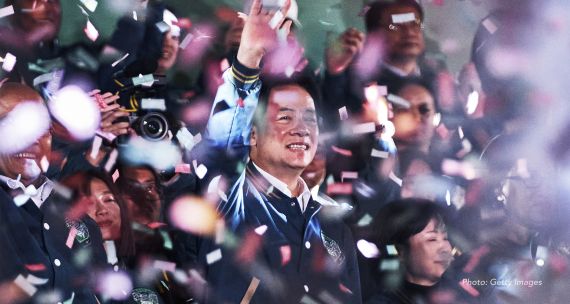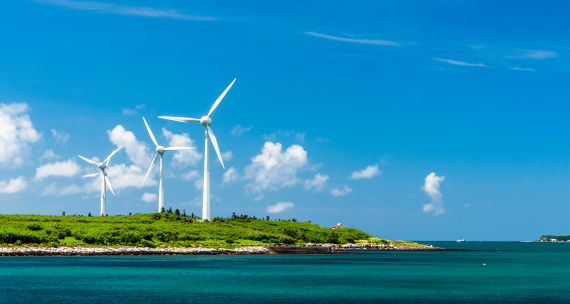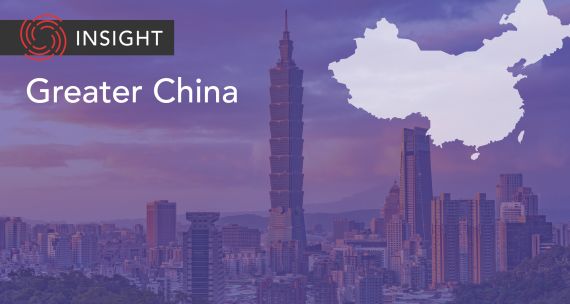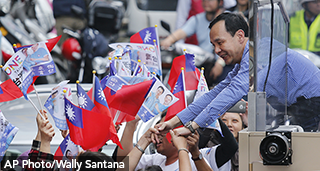 On January 16, 2016, voters in Taiwan will head to the polls and elect a new President, as well as 113 representatives to the Legislative Yuan. Taiwan’s current President, Ma Ying-jeou of the ruling Kuomintang (KMT) Party, has served his two-term limit. Ma’s popularity, however, is at an all-time low, having plummeted soon after his second term started in 2012. The KMT, along with its Pan Blue allies, has maintained control of the Legislative Yuan ever since Taiwan held its first full assembly elections in 1992. In 2012, the KMT took 64 of the legislature’s 113 seats, thus controlling a legislative majority and the presidency, while the main opposition party, the Democratic Progressive Party (DPP), won just 40 seats. The remaining nine seats were won by smaller coalitional parties.
On January 16, 2016, voters in Taiwan will head to the polls and elect a new President, as well as 113 representatives to the Legislative Yuan. Taiwan’s current President, Ma Ying-jeou of the ruling Kuomintang (KMT) Party, has served his two-term limit. Ma’s popularity, however, is at an all-time low, having plummeted soon after his second term started in 2012. The KMT, along with its Pan Blue allies, has maintained control of the Legislative Yuan ever since Taiwan held its first full assembly elections in 1992. In 2012, the KMT took 64 of the legislature’s 113 seats, thus controlling a legislative majority and the presidency, while the main opposition party, the Democratic Progressive Party (DPP), won just 40 seats. The remaining nine seats were won by smaller coalitional parties.
Unlike in previous electoral contests, where the eventual victor was less easy to predict, it appears almost certain the DPP’s presidential candidate, Tsai Ing-wen, will win the presidency, and it is likely the DPP will win a majority of the seats in the Legislative Yuan. Even if the DPP does not control the legislature outright, there is little doubt the DPP will be the largest party in the assembly. The November 2014 local elections – also known as the “nine-in-one” elections during which nine mayors were elected along with county magistrates – were a harbinger of the KMT’s electoral woes as the party took a major hit losing eight posts, while the DPP gained an additional seven. Media polling in the run-up to the 2016 elections consistently shows the DPP’s Tsai enjoying a virtually unassailable lead, topping at times the 50 per cent mark, while the KMT’s candidates have continued to poll very poorly.
With the DPP poised for an historic victory, there are big questions about the future of Taiwan’s politics: Will cross-Strait relations deteriorate? Can the KMT survive the expected loss? Will the government turnover lead to a major change in social and economic policy? In an effort to address these and other questions, this article provides a brief overview of the players involved in the election, the causes behind the anticipated DPP victory, and the political stakes of the competition.
Who are the main players?
Tsai Ing-wen and the DPP: In many respects, the nationwide elections in Taiwan, both for the presidency and the Legislative Yuan, is a two-party race between the DPP and the KMT. The DPP’s Tsai Ing-wen is running for president for a second time. She was defeated in the 2012 election by the KMT’s Ma Ying-jeou by a considerable six per cent margin (51.6 per cent to 45.6 per cent). Tsai is the chair of the DPP, a post she has held since 2008, though she only joined the party in 2004. Prior to joining the party, Tsai served as the chair of the Mainland Affairs Council under DPP President Chen Shui-bian as a non-partisan appointment.
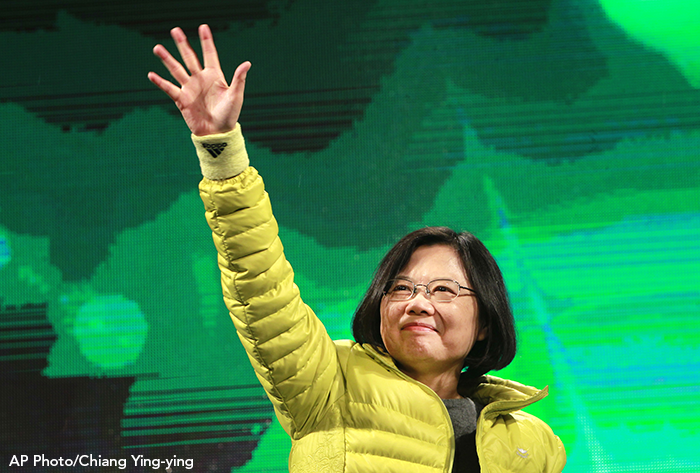 Viewed widely as politically moderate, with a background as a law school professor, Tsai’s leadership of the DPP is seen to have resuscitated the party after several scandals under two-term DPP President Chen (2000-2008). Her vice-presidential running mate is Chen Chien-jen, a health scientist at the Academia Sinica, Taiwan’s top research institution, and former Minister of Health.
Viewed widely as politically moderate, with a background as a law school professor, Tsai’s leadership of the DPP is seen to have resuscitated the party after several scandals under two-term DPP President Chen (2000-2008). Her vice-presidential running mate is Chen Chien-jen, a health scientist at the Academia Sinica, Taiwan’s top research institution, and former Minister of Health.
The DPP has historically been the main opposition party in democratic Taiwan. Born out of the opposition tangwai movement of the 1970s and 1980s, the DPP was formed in 1986 and contested legislative elections in 1992 and presidential elections in 1996. Though the DPP won the presidency in 2000 and 2004, the party and its Pan Green alliance (comprising smaller parties which also strive for a more autonomous Taiwan) has never controlled the Legislative Yuan. The DPP is a pro-Taiwan party and is suspicious of closer relations with China. Though its early platform included a pro-independence mandate, the party, especially under Tsai, has advocated for maintaining the status quo across the Taiwan Strait: a de facto autonomous, though not de jure independent, Taiwan.
Eric Chu and the KMT: The KMT’s presidential candidate is Eric (Li-Luan) Chu, currently the mayor of New Taipei City and chair of the KMT. Chu was nominated to be the KMT candidate in October, 2015. Chu was long thought to be a leading candidate for the KMT’s presidential ticket, but he initially demurred. The party instead selected Hung Hsiu-chu to run for president. Hung is a KMT elder, having won her legislative seat eight consecutive times and serving in various leadership positions within the party. Her nomination was panned, however, and her popularity among voters was low. In an attempt to reverse the trend, the KMT replaced Hung’s nomination by selecting Chu. Despite being a darling of the KMT establishment, Chu has not fared much better in pre-election polls. He is viewed by many to be too close to the very unpopular incumbent President Ma. Chu’s vice-presidential running mate is Jennifer (Ju-Hsuan) Wang, the former Minister of the Council of Labor Affairs. Mired in a real estate scandal, Wang’s nomination has not revived the KMT’s chances for winning the presidency in 2016.
The KMT relocated to Taiwan during the late 1940s when it lost the Chinese Civil War to the Communist Party. Under the leadership of General Chiang Kai-shek, the KMT sought to eventually retake China. The KMT thus governed Taiwan under Martial Law and with a terribly repressive regime. After Chiang’s death in the 1970s, party leadership was handed to his son, Chiang Ching-kuo. Beginning in the 1980s the KMT dictatorship began to loosen the reins gradually, allowing the formation of the opposition DPP in 1986 and the lifting of Martial Law a year later in 1987. Taiwan’s first full legislative elections were held in 1992 and presidential elections in 1996, both of which the KMT won handily. The KMT, given its mainlander roots, is sympathetic to closer relations with China. The incumbent ruling party has maintained its political dominance for having steered Taiwan’s postwar economic development. The KMT presents itself as the party best able to manage cross-Strait relations with Beijing and to lead Taiwan’s economic development.
James Soong and the PFP: As in the previous election, the 2016 presidential contest includes a third candidate, James Soong. Soong is a veteran politician in Taiwan, originally a member of the KMT, though in more recent years the leader of his own party, the People’s First Party (PFP), which Soong founded in 2000 after his first failed attempt to win the presidency. Soong’s – and the PFP’s – relationship with the KMT is complicated. In some instances, he and his party have been considered a part of the Pan Blue camp headed by the KMT; though in many other instances, Soong has taken on a more independent posture vis-à-vis the KMT. In the 2016 election run-up, Soong has teamed up with former KMT legislator Hsu Hsing-Ying as an independent, third ticket for the presidency. They have positioned themselves as a centrist alternative to the DPP and KMT. Capitalizing on the unpopularity of the KMT’s Chu-Wang ticket, James Soong, according to the most recent surveys, is polling at about 14 per cent, or just five per cent behind the KMT.
The Third Force: The 2016 legislative elections features a collection of “third force” parties; they are considered “third” parties as they do not fall within either the KMT’s Pan Blue (comprising the KMT and splinter parties originating in the KMT) or DPP’s Pan Green camps. The New Power Party (NPP) has gained the most momentum, and is expected to win a few legislative seats. Smaller third force parties, notably the Green Party and the Social Democratic Party, are unlikely to win either a district seat or party list seat through proportional representation (as the party would need to win at least five per cent of the popular vote), but have nonetheless gained considerable voice and agenda-setting power in the run-up to the elections. Veterans from civil society, including most recently leaders and activists from the 2014 Sunflower Movement, are pushing mainstream parties and politicians to consider important social policy issues (gender equality, labour rights, and social welfare) and environmental policies. The third force parties have appealed to younger voters.
Why the KMT will (almost certainly) not win
Barring any unforeseen surprises, it is almost certain the KMT will lose the presidential elections as well as control of the Legislative Yuan; to be sure, the chatter in Taiwan is not about whether the KMT will lose, but rather, how badly. There are several reasons for this.
An Unpopular Incumbent: President Ma is very unpopular, and his successor, Eric Chu, has inherited this unpopularity. The KMT has been Taiwan’s presumptive ruling party since Taiwan democratized during the early 1990s. While the party lost the presidency to the DPP in 2000 and 2004, the KMT (and the Pan Blue camp) has always maintained dominance of the legislature. In 2008 and 2012, the KMT ran on a platform of economic prosperity and the promise of stable relations across the Taiwan Strait. Benefiting from the disastrous end to the previous Chen administration, which was mired in personal scandals, the KMT and Ma easily sold the party’s plans to voters. Ma’s performance since taking office, however, has been lacklustre. Seen as indecisive, arrogant and having sold-out Taiwan to China, Ma’s presidency has undermined the KMT’s claims to effective government.
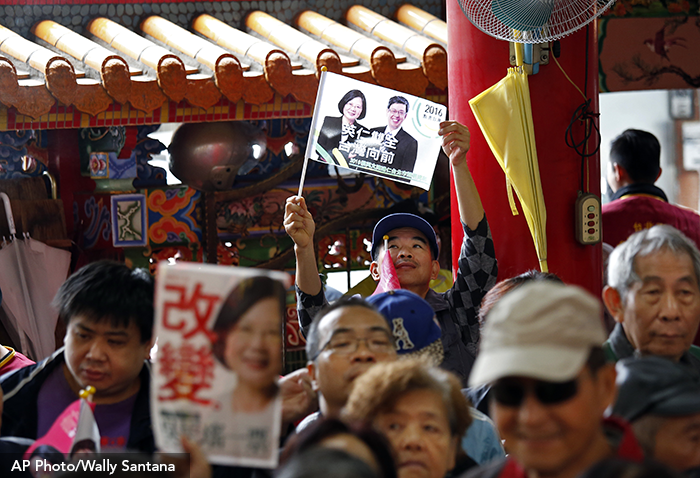 Economic Discontent: The economy has been sluggish under the Ma government, experiencing a much slower rate of growth than in the past. Taiwan remains an export economy, though is increasingly dependent on trade with China. Efforts to create an innovation-driven economy have fallen short of expectations, and Taiwan’s industrial manufacturing sectors have gradually been hollowed-out, with firms moving their operations offshore. The service / tertiary sector continues to expand, though growth in value-added activities in the service sector has not been as robust as hoped. Thus, while the overall performance of the economy has been generally positive (i.e. a net positive growth rate), the distributive effects of such growth are being adversely felt at home. Inequality is on the rise; jobless growth is the norm; young and educated workers are underemployed; wages are stagnant; and, consumption inequality is increasing. These effects can be partly explained by President Ma’s efforts to economically integrate Taiwan into China. Most notably, in 2010, the Ma administration pushed through the landmark Economic Cooperation Framework Agreement (ECFA), essentially a limited free-trade agreement with China. The ECFA has benefited some industrial sectors, but not others.
Economic Discontent: The economy has been sluggish under the Ma government, experiencing a much slower rate of growth than in the past. Taiwan remains an export economy, though is increasingly dependent on trade with China. Efforts to create an innovation-driven economy have fallen short of expectations, and Taiwan’s industrial manufacturing sectors have gradually been hollowed-out, with firms moving their operations offshore. The service / tertiary sector continues to expand, though growth in value-added activities in the service sector has not been as robust as hoped. Thus, while the overall performance of the economy has been generally positive (i.e. a net positive growth rate), the distributive effects of such growth are being adversely felt at home. Inequality is on the rise; jobless growth is the norm; young and educated workers are underemployed; wages are stagnant; and, consumption inequality is increasing. These effects can be partly explained by President Ma’s efforts to economically integrate Taiwan into China. Most notably, in 2010, the Ma administration pushed through the landmark Economic Cooperation Framework Agreement (ECFA), essentially a limited free-trade agreement with China. The ECFA has benefited some industrial sectors, but not others.
Mishandled Trade Deal: One might reasonably argue that Taiwan’s sluggish economic performance cannot be entirely attributed to the ECFA and thus to Ma’s administration. After all, Taiwan’s is a mature, post-industrial economy and like all other similarly developed economies around the world, it faces difficult challenges with respect to balanced growth, generating employment, advancing innovation and diversifying trade. But the Ma government has politically bungled its management of the economy. The ECFA, which the DPP’s Tsai Ing-wen has stated she would not dismantle if she were elected president, was politically handled by the Ma administration without transparency and with little public debate and consultation. Ma’s later efforts to railroad through the Cross-Strait Service Trade Agreement (CSSTA) with China, again with little consultation, resulted in the mobilization of students and civil society, culminating in the Sunflower Movement that occupied the Legislative Yuan and Executive Yuan during the spring of 2014. By the conclusion of the Sunflower Movement’s occupation that summer, the KMT leadership was split, the opposition had been emboldened, and Ma was left with little political support.
A Popular, Moderate Opponent: The KMT will almost certainly lose the 2016 election because Tsai Ing-wen has demonstrated throughout the campaign that she is politically moderate. In the past, the KMT has attempted to scare voters away from the DPP, citing the opposition party’s pro-independence stance as an obstacle to stable cross-Strait relations. Tsai has steadfastly stated that her administration will maintain the “status quo” in cross-Strait relations. To quell anxieties within American foreign policy circles, Tsai visited the U.S. in the spring of 2015 and reiterated her moderate stance with respect to relations with China. In private conversations in China, colleagues tell me China would likely be less resistant to Tsai’s presidency precisely because she is viewed to be much more moderate and pragmatic than former DPP president Chen Shui-Bian.
What’s at stake?
In many respects, the expected election results will be unprecedented: Taiwan will have its first female president; the DPP will likely control both the executive and legislative branches of the government; and, the KMT (and the Pan Blue camp) may, for the first time ever, lose control of the Legislative Yuan. But what are the implications of this likely political sea-change?
A New Normal. Some analysts contend that perhaps Taiwan’s politics has entered a new phase, a “new normal.” Party identification with the KMT has declined quite considerably over the Ma administration, and with that, popular identification with Taiwan has grown. The vast majority of Taiwanese embrace the economic opportunities that come with globalization (and closer economic relations with China) but resist being integrated into China. In other words, the identity question is, more or less, settled in Taiwan. Instead, the new normal in Taiwan’s politics has less to do with identity politics and more to do with bread-and-butter issues such as jobs, wages, housing and social mobility, as well as post-industrial issues centred on the environment, knowledge-based innovation, and equity.
Partisan Realignment. If democratic politics in Taiwan has entered into a new normal where conventional identity politics have begun to give way to other socio-economic cleavages, then we might expect some partisan realignment among the major political parties as they build new coalitions of electoral support. Historically the DPP has been identified with the left, while the KMT has been seen to be a conservative party. At the moment, however, both are considered centrist parties. Indeed, the current electoral debates between the DPP and KMT have had more to do with which party can deliver economic benefits effectively rather than any ideological position. This could change, however, in future electoral cycles, particularly as third force parties gain momentum among younger voters.
Cross-Strait Relations. The recent Xi-Ma meetings (during which Chinese President Xi Jinping met with Taiwan President Ma Ying-jeou in Singapore) provided little political benefit to the KMT, affirming how most Taiwanese do not view closer relations with China to be beneficial to Taiwan. China is not expected to interfere with the 2016 elections, as it did in 1996 when it launched missiles into the Strait in order to intimidate voters from voting for the DPP. Nonetheless, Ma’s efforts in currying relations with Beijing may have shifted the status quo slightly towards China’s favour. Ma’s insistence, for example, on invoking the so-called 1992 Consensus (which China understands to mean Taiwan and China are “one China”) in dialogues with China may constrain a future DPP president in dealing with China. To what extent Tsai, should she win the presidency, would push for greater international space for Taiwan vis-à-vis China remains to be seen.
Future of the KMT. The KMT is a resilient party. After all, the KMT conceded the formation of the opposition DPP in 1986; a factional split resulted in the formation of the splinter New Party in 1993; the party expelled its former leader and Taiwan’s first elected President, Lee Teng-Hui; and, James Soong defected in 2000 and created another splinter party, the PFP. But while the KMT (and the Pan Blue camp) has weathered several political crises in the past, it has never faced the very likely prospect of losing control of the Legislative Yuan and the presidency. Simply put, the party is on its heels. Though the party’s organizational basis endures and its financial assets remain more or less intact, the fact of the matter is that the leadership is deeply split, the rank-and-file are defecting, and its historical claims to economic development and cross-Strait stability are increasingly untenable and unbelievable among Taiwanese voters. How the KMT will react to its defeat in the 2016 elections and how it rebuilds afterwards are crucial developments in Taiwan’s democratic evolution.
Implications for Taiwan-Canada Relations
For Canada, the outcome of the election is relatively inconsequential in terms of political and diplomatic relations in that the relationship between Taiwan and Canada is largely commercial and trade-oriented. The election may provide some momentum for Taiwan’s bid to join the Trans-Pacific Partnership (TPP), a prospect that is generally welcomed in Taiwan. However, a DPP victory will likely have a more significant impact on Taiwan’s domestic politics and policies. This presumes that China accepts the election results and does not attempt to change the status quo across the Taiwan Strait. Tsai’s promises to pursue a moderate path forward are credible, at least in the short-term.
